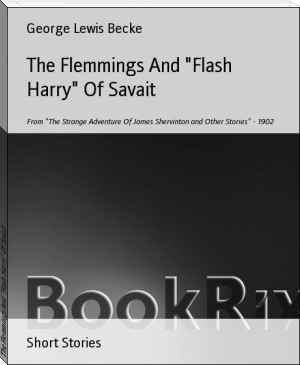The Flemmings And "Flash Harry" Of Savait, George Lewis Becke [books to read for beginners TXT] 📗

- Author: George Lewis Becke
Book online «The Flemmings And "Flash Harry" Of Savait, George Lewis Becke [books to read for beginners TXT] 📗». Author George Lewis Becke
"I wonder if it is possible that the four men I am looking for are among the outlaws," said Flemming.
"Possible, quite possible," replied the manager, "but you will never be able to see them if they are. The gang is very desperate and determined, and though they have no animus against me personally, they would shoot me, or you, or any white man who attempted to get into communication with them."
After a little further conversation with the manager, Flemming said he would have a few hours' pigeon-shooting, returning in time to see the plantation hands mustered. Knorr wished him to take a Samoan guide, but the young man laughingly reminded him that he was half a native himself, and from his infancy almost had been used to wandering about the mountain forests of the islands of Micronesia and Polynesia; so, bidding his host good morning, he shouldered his gun and set off, and in another hour was ascending the first spur of the mountain range, which traverses the island of Upolu from one end to the other.
He had a reason for declining the services of a guide, for he had determined to attempt to reach the outlaws' refuge, and, at the risk of his life, finding out if Tommy Topsail-tie and Jack Waterwitch were among them. The old trader had told him that one of their number was a very big man, whose legs, back, and neck were tattooed as the Kingsmill Islanders tattoo, and he (Flemming) had formed the idea, since his conversation with the manager of the plantation, that this big man was Binoke--the dear friend of his boyhood's days, the ever-wanted "Tommy Topsail-tie" of his brother and his sister Medora, the man who, with Jack Waterwitch, had stood to his father and mother in their poverty and distress, and had toiled night and day for them without recompense.
As he walked over the soft carpet of fallen leaves which covered the mountain-side so thickly that no sound came from his footsteps, he listened carefully. He knew that he was proceeding in the right direction for the outlaws' refuge--the direction the plantation manager had impressed on him to avoid--and after a two hours' stiff climb he found himself on the summit of the spur and overlooking the harbour. Far below him he could see the _Maori Maid_ being hauled on to the beach, and eight miles away the beautiful little island of Manono lay basking in the sun on a sea of deepest, glorious blue.
Suddenly he heard a sound, a faint, soft creeping on the ground somewhere near him, and he knew that it was the sound of a human footstep, and that he was watched.
He laid down his gun, and stood up and pretended to closely scan the thick, leafy canopy of the mighty trees overhead, as if he were searching for pigeons. Then his voice rang out clearly, and echoed and re-echoed in the grey and silent forest aisles.
"Binoke, Binoke! 'Tis I! Nobal, Nobal! 'Tis I who call! Tis I, Papu (Bob), of Anaa! I, who have sought thee long. Binoke! Nohal!"
Then came a sudden rush of feet and brown, naked bodies from all around, and in another moment the young man was almost lifted off hid feet by Tommy Topsail-tie, who, clasping his mighty arms around him, pressed him passionately to his bosom.
"My boy, my boy!... See, 'tis I, Binoke, thy friend, thy slave, thy Binoke!" and then the savage creature wept as only wild people such as he was weep from excess of joy.
In a few minutes Flemming was hurried along by the friendly hands of six or eight of the "wild men" to their refuge further up on the mountain-side, where he found not only "Jack Waterwitch," but one of the Anaa natives, who had been carried off ten years before; the other native of Anaa, he was told by Tommy Topsail-tie, had died a year or two previously. There were, he found, twelve natives in all--Topsail-tie, who was their leader, Jack Waterwitch, the Anaa man, four Solomon Islanders, and five others from various islands.
For an hour or more the young man conversed with his old friends, who delightedly agreed to leave their mountain retreat and go on board the brigantine as soon as she was ready to sail. The remaining eight men, however, refused to leave, although Flemming told them that they could all come down from the mountain at night-time, and be very easily stowed away on board, and that even if they were discovered the captain would be able to protect them, should the German manager make any demand for them to be delivered over to him. But all his arguments were in vain--they shook their heads and said that never, again would they go, willingly or unwillingly, upon the deep sea.
Then the supercargo and Topsail-tie made their plans, and after spending another hour or so with the escapees, Flemming shook hands with them all, and guided by Nobal, returned to the base of the mountain.
Here he parted from his companion, who quickly plunged into the forest again, and reached the plantation just as the manager was mustering the plantation hands for his inspection. Not deeming it advisable to tell his host of the discovery he had just made, he yet tried to display as much interest as possible, and after walking up and down the triple rows of men and looking at them rapidly one by one, he said that there was no one of them whom he had ever seen before. Then the manager dismissed the men, and Flemming, thanking him for his kindness, hurried on board and told his story to Captain Heselton.
Two days afterwards the _Maori Maid_ was sailing slowly out through Mulifanua passage. Flemming, with the skipper beside him, was standing on the poop, looking for'ard.
"Tell them they can come up on deck now, boatswain," he cried, "we are a good mile off the land."
And then the three of the four men from whom he and his brother had parted ten years before rushed up from the hold, knelt at his feet, and laughing and sobbing like children, threw their brown arms around his legs.
Binoke rose, and stretching out his huge right arm towards the rising sun, turned his black eyes on "the boy" he so loved.
"Is it to the east we sail, Papu?"
"Ay, to the east, Binoke, far, far to the east, to a fair, fair land with green mountains and falling streams. And there awaits us my father and mother, and my brother, and Medora. And they will be well content with me, for never hast thou and Nobal been forgotten."
"FLASH HARRY" OF SAVAIT
Nearly thirty years ago, when the late King Malietoa of Samoa was quietly arming his own adherents and conciliating his rebel chiefs in order to combine against the persistent encroachments of the Germans, I was running a small trading cutter between Upolu and Savaii, the two principal islands of the group.
One day I arrived in Apia Harbour with a cargo of yams which I was selling to an American man-of-war, the _Resacca_. I went alongside at once, had the yams weighed and received my money from the paymaster, and then went ashore for a bathe in the Vaisigago River, a lovely little stream which, taking its rise in the mountains, debouches into Apia Harbour. Here I was joined by an old friend, Captain Hamilton, the local pilot, who, stripping off his clothes, plunged into the water beside me.
As we were laughing and chatting and thoroughly enjoying ourselves, a party of natives--young men and boys--emerged from the trees on the opposite bank, and casting off their scanty garments, boisterously entered the water and began disporting themselves, and then to my surprise I saw that their leader was a white man, tattoed in every respect, like a Samoan. He appeared to be about thirty years of age, was clean-shaven, and had bright red hair.
"Who is that fellow?" I inquired.
"One of the biggest scoundrels in the Pacific," replied my companion, "'Flash Harry' from Savaii. He deserted from either the _Brisk_ (or the _Zealous_) British man-of-war, about seven years ago, and although the commanders of several other British warships have tried to get him, they have failed. He is the pet _protege_ of one of the most powerful chiefs in Savaii, and laughs at all attempts to catch him. To my knowledge he has committed four atrocious murders, and, in addition to that, he is a drunken, foul-mouthed blackguard. He only comes to Apia occasionally--when there is no British man-of-war about--and paints the town red, for although he is merely a loafing beachcomber, he is liberally supplied with money by his chief, and possesses an extensive harem as well. He simply terrorises the town when he breaks out, and insults every timid European, male and female, whom he meets."
"Why doesn't some one put a bullet through him?"
"Ah, now you're asking! Why? Porter" (a respectable Samoan trader) "told him that he would riddle him if he came inside his fence, and the scoundrel knows _me_ well enough not to come into my place with anything but a civil word on his foul tongue; but then you see, Porter and I are Americans. If either or both of us shot the man no commander of an American man-of-war would do more than publicly reprimand us for taking the law into our own hands; but if you or any other Englishman killed the vermin, you would be taken to Fiji by the first man-of-war that called here, put on your trial for murder, and, if you escaped hanging, get a pretty turn of penal servitude in Fiji gaol."
We finished our bathe, dressed, and set out for Hamilton's house on Matautu Point, for he had asked me to have supper with him. On our way thither we met the master of a German barque, then in port, and were chatting with him in the middle of the road, when Mr. "Flash Harry" and his retinue of _manaia_ (young bucks) overtook us.
The path being rather narrow we drew aside a few paces to let them pass, but at a sign from their leader they stopped. He nodded to Hamilton and the German captain (neither of whom took any notice of him) then fixed his eyes insolently on me and held out his hand.
"How do yer do, Mister. You're a nice sort of a cove not to come and see me when you pass my place in your cutter"--then with sudden fury as I put my hands in my pockets--"you, you young cock-a-hoopy swine, do you mean to say you don't mean to shake hands with a white man?"
"Not with you, anyway," I answered.
"Then the next time I see you I'll pull your ------ arm out of the socket," he said, with an oath, and turning on his heel he went off with his following of bucks. All of them were armed with rifles and the long beheading knives





Comments (0)